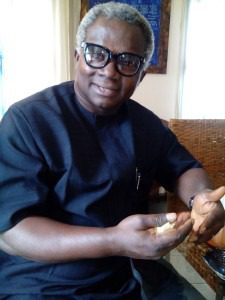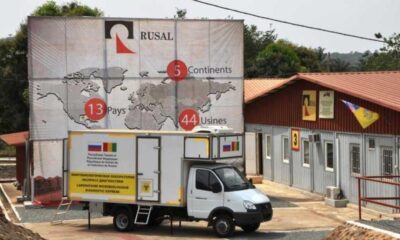National Issues
Buhari’s 100 Days As Foundation for A Progressive Country -By Osita Okechukwu


Osita Okechukwu
My take is that President Buhari is meticulously constructing a progressive Nigeria, a country of prosperity and better life for its people, devoid of extreme poverty, gross unemployment and the liquidation of the middle class.
My narrative of the first 100 Days of President Muhammadu Buhari’s administration, without being immodest, is to award an excellent grade for its laying of the foundation for a progressive Nigeria; it is a score-card whose framework to change Nigeria still appears a mirage to some.
The time and meticulous manner the president is taking in constructing the foundation confounds many, especially those who wish that Mr. President completes projects like the Second Niger Bridge or chases away the Boko Haram insurgents under 100 days. Such has not happened, but we have moved from uncertainty to certainty and from public officers to either shape in or ship out.
Many critics for either mischief or utter ignorance easily gloss over the fact that it is very difficult to either notice or even properly assess the quantity and quality of concrete, iron rods, pipes and planks which go into the building of a high rise structure. Tools to diversify our economy are being fashioned out, for the dwindling oil revenue has left a deep hole in our national treasury, and this calls for cordial bi-partisan cooperation.
Therefore to rekindle Nigeria’s hope, reposition its vast human and material resources and salvage the country from a dangerous slide into becoming a failed state is akin to rebuilding the World Trade Centre. This is more so considering that Mr. President met an almost empty treasury, and a huge pile of unpaid salaries, consequent upon the mindless, pervasive and unbridled corruption of the last regime.
My take is that President Buhari is meticulously constructing a progressive Nigeria, a country of prosperity and better life for its people, devoid of extreme poverty, gross unemployment and the liquidation of the middle class.
We may recall that the urge to return Nigeria to it’s lost glory as a truly African leader made the president weep openly in 2011 before the then presidential election, when the merger of the Congress for Progressive Change (CPC) with the defunct Action Congress of Nigeria (ACN) collapsed. There were many interpretations to his cry for our beloved country; while some people considered it altruistic, naturally others regarded it as a symptom of inordinate ambition.
Luckily today, the outcome is that the global community has welcomed Nigeria back into its fold; just because of the integrity of one man. Its a renewal party Nigeria will forever celebrate if we all join hands with Mr. President to revamp our dilapidated social and physical infrastructure. And accordingly construct a progressive state, where poverty will be minimised, gross unemployment will be halted and inequality mitigated.
My assumption on why many, and even some members of our great party fail to appreciate the import of this vital foundation is because he did not, in his first 100 days, follow the traditional ground breaking flag-off of major projects, like roads, bridges, coal and gas power plants, hospitals etc, but rather devoted more time battling to plug the leakages in the system and rake in stolen funds.
The fact remains that outside his crusade to wage strident war against corruption as enunciated in the manifesto of the All Progressives Congress (APC) and his containment of the Boko Haram insurgents, Mr. President has uncountable score-card of building a silent foundation for a New Nigeria, the enthronement of a progressive era, construction of pro-people programmes and pursuit of the empowerment of the greatest number of citizens.
I think its imperative that one traces the trajectory of how this score-card is derived. It is derived from the aphorism or maxim in liberal democracy, which posits that in the struggle between any president’s formal authority and his integrity quotient or body language, in other words the aura phenomenon, one will surely triumph.
For this of school of thought posits that the President’s Real Power does not depend upon his Formal Authority, but upon his Abilities of Persuasion. A former American president, Harry Truman said, “I sit here all day trying to persuade people to do things they ought to have sense enough to do without my persuading them… that’s all the powers of a president amounts to.”
In this instance, President Buhari’s integrity quotient has triumphed over his formal authority and garnered the score-card of improved electricity supply, regular fuel supply, the resurgence of anti-graft war and others.
It’s important we ask ourselves what made the federal permanent secretaries who were in bed with the profligacy of the last administration convert into born agains today? Or why the former Chief of Defence Staff, Alex Bade, who chided the governor of Borno State, Ibrahim Shettima, when he said frustratingly that Boko Haram is better equipped and better motivated, sang the same song in agreement with Shettima subsequently? The change coming out from the Buhari phenomenon is endless.
Many pundits have argued that the improved electricity and regular fuel supply should be credited to our dear ex-president, Dr Goodluck Ebele Jonathan, and that the integrity quotient of President Buhari did not contribute or play any role in in this change.
Then you ask them, why, even with the constitutionally programmed 2015 presidential election in view since May 29, 2011 and a solid five years down the line with the unprecedented oil revenue earnings, Jonathan could neither fix or improve electricity or fuel supply?
The simple answer is that the ex-president couldn’t for he lacked the necessary integrity quotient and aura phenomenon to move mountains. As the writer Neustadt, quoting an Eisenhower aide in 1958 said, :The President feels that when he has decided something that ought to be that’s the end of it…that when it bounces back undone or done wrong, he tends to react with shocked surprise.” This is exactly the dilemma of our former president.
Aside the huge benefit of the Buhari-Phobia that has re-energised both private and public servants, we have also noticed the silent reclamation of the people’s ownership or participation in our commonwealth. This is evident in Mr. President’s blunt refusal to remove the fuel subsidy, the refusal to sell state owned refineries, the stimulus bail out funds to state governments and the establishment of social safety nets like school meals in the offing.
May one restate that Mr. President genuinely wants to consolidate democracy wherein the socio-economic happiness of the greatest number of Nigerians is guaranteed. Thus the revamping of the sordid condition he noted in his Chatham House speech of February, 2015, about “a growth that, on account of mismanagement, profligacy and corruption, has not translated to human development or shared prosperity.”
Before one comes back to this very important catalyst of the change mantra which is unfolding, it will be pertinent to point out that Mr. President is relying on the 1999 Constitution of the Federal Republic of Nigeria as amended, which under Section 16(7)(c) stipulates that, “the economic system is not operated in such a manner as to permit the concentration of wealth or the means of production and exchange in the hands of few individuals or of a group.” This is the outcome of a rotten, thieving state, which breeds unrest and insurgency.
One stands to be corrected in stating that the return of the progressive era is one of the major achievements of the first 100 days of Buhari’s regime. For the progressive era has been on the retreat, if not in a state of decline in the last three decades in Nigeria. Indeed the decline of the progressive era started with the exit of President Buhari from government in 1985.
We must recall that the decline of the progressive era emanated from the pursuit of a nebulous economic policy which proclaims that government has no business in business. This policy more than any other factor led to the collapse of the textile and other light industries in Nigeria, hence the attendant gross unemployment and despondency in the land.
Ironically, what they dubbed business is the critical social and physical infrastructure which history at all times have adjudged the bedrock of development. The commitment of leaders like Abraham Lincoln, Hubert Hoover, Theodore Roosevelt and others in investing state resources is the outcome of the modernisation of American Infrastructure.
Paradoxically also was that the advanced countries of Western Europe and North America people often refer to where the state has almost abandoned direct intervention in or the ownership of enterprises have in place social safety nets for their citizenry. To rationalise why the Nigerian state should back off investing in our infrastructure, they will tell you how Margaret Thatcher privatised the British Rail, but they will not tell you that the British rail system had existed for over hundred years under state ownership before the privatisation.
When we returned to democracy in 1999, many Nigerians thought that the Peoples Democratic Party (PDP) led federal government would reverse the trend of the nebulous economic policy, which some call the Washington Consensus or the International Monetary Fund (IMF) simulated programme, but they did not.
Rather, what the PDP did, quoting Mr. President Chatham speech once again, was that they, “created two economies in one country, a sorry tale of two nations: one economy for a few who have so much in their tiny island of prosperity; and the other economy for the many who have so little in their vast ocean of misery.’
As Professor Sam Aluko of blessed memory noted, “The Nigerian economy is moreover not yet a modernised or capitalist economy, even though the ongoing reform programmes try to run a capitalist economy without capital.”
My understanding of the progressive era being constructed is anchored on President Buhari’s belief that corruption will kill Nigeria if we do not kill corruption. The task is to eradicate poverty, provide employment and mitigate the growing inequality, as articulated in his road map to our collective development. He also believes that not all Nigerians are thieves and that with collective efforts more will be achieved.
The progressive era is more or less located in the mixed economy spectrum, as the input of the private sector is still highly courted by Mr. President. The society is the greatest beneficiary, where the state and the private sector work in harmony.
Alternatively the society like ours is in peril, where the state is in recess and has abandoned its primary responsibilities; because we cannot build a capitalist state without an industrial society nor an industrial society without critical social and physical infrastructure.
The journey has begun, the Treasury Single Account (TSA), the Professor Itse Sagay anti-graft committee and the relocation of the military command headquarters to Maiduguri are all aimed at building the blocks for a progressive Nigeria.
For those who tag the ongoing war against corruption as selective, one counsels that they should rest assured that sooner or later, there will be no boundaries. The president wants to restore faith in the anti-graft agencies; for a cursory study of principle of dialects will convince any one that the thesis will lead to a synthesis and nowhere for thieves to hide.
In sum, Mr. President has demonstrated his commitment to fight insurgency and corruption and has designed the economic road map for the greatest number of Nigerians to participate in the socio-economic activities without hitch or hindrance. This is the foundation for a progressive Nigeria and a road-map to a win-win-scenario.
Osita Okechukwu is a member of the All Progressives Congress (APC).


















